August 9, 2020
JENNIFER GROSS (JG): You are well-practiced in close observation as part of your work process. As you are sheltering in, what have you found yourself drawn to look at more closely?
RICHARD FLEISCHNER (RF): It’s important to understand that I live and work in a large multistory building in Providence, RI. Fortunately sheltering in place has not caused a significant change in my situation, or daily workday. During the last 40 or more years the studio has been both a refuge and laboratory for creating a place that is defined by the sum total of all my creative processes. Within the larger sited projects, the sense of enclosure and containment has been at the foundation of these projects. They are contextualized within the larger fabric of the entire site; and although very few of their elements have been completely enclosed and providing actual shelter, they do provide a defined place; consisting of various configurations very deliberately scaled and placed as part of a larger sequence of destinations drawn from the entire larger site.
During this time of staying inside I've been paying more and more attention to the very spirit of humanity that underlies the word "shelter". I’ve been revisiting two images in particular — the first, an illustration of a Khitan1 noble's field camp. The second is an image that I took in Kosovo during the war. Kosovo was, at that time, torn apart, and I took this photograph within an encampment that had been used by women as a shelter to escape the dangers of war and rape.
1 The Khitan people were a nomadic people from Northeast Asia that inhabited parts of East and Central Asia from the 4th Century onwards
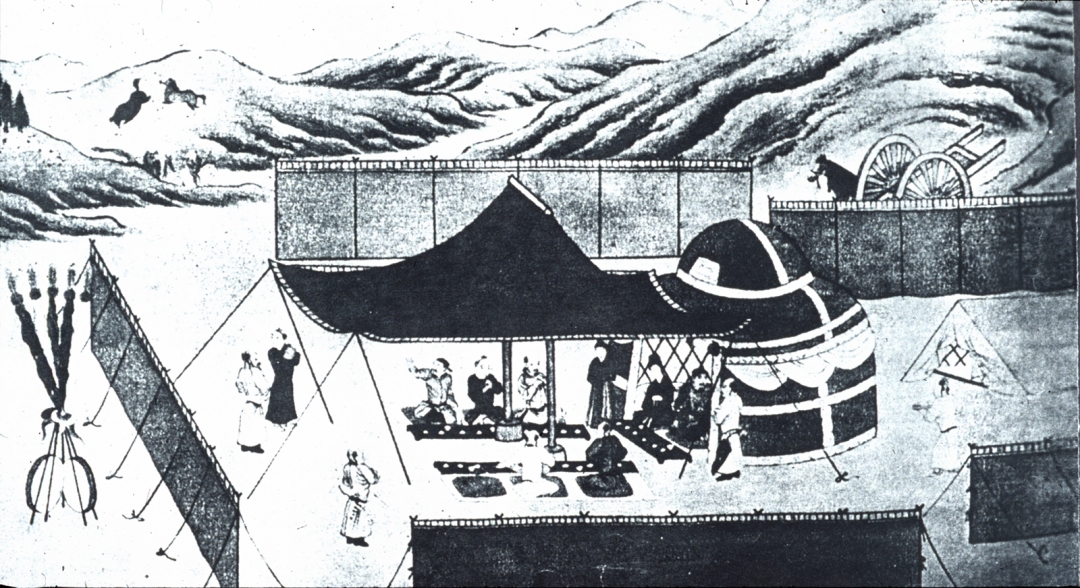
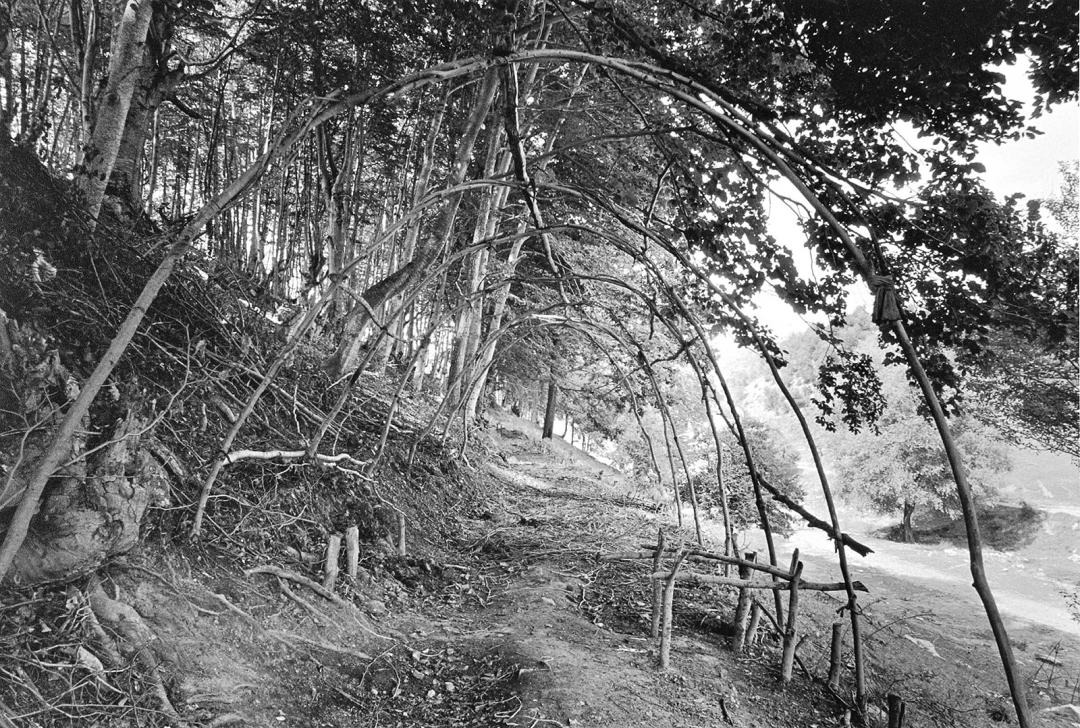
Above: Unknown artist, untitled illustration of a Khitan nobleman’s camp. Circa 1100 CE
Below: Framing of one of the structures inside encampment in Kosovo, used to shelter refugees fleeing Serbian forces. 1999. Image courtesy Richard Fleischner. © Richard Fleischner.
RF: In each of these photographs, I'm drawn towards the simplicity of the materials and techniques used to construct the places that offered each group a measure of safety, and shelter. In Kosovo, these camps were made of branches; bent and lashed together. Later they were covered with a plastic sheet. I photographed the bare bones of the encampment, and you can barely make out the structures on the interior that served as tools for living.
The meaning of shelter is no different now than it was before the pandemic. What I was interested in, and continue to be interested in, is how we have managed to define and make shelters — lines and planes used to determine boundaries, differentiating "inside" from "outside", and simple volumes and forms that turn a space into a place. Translating the rudimentary, unassuming, and yet essential creation of places that form the core of my practice, in both my large-scale sited works, and individual studio sculptures.
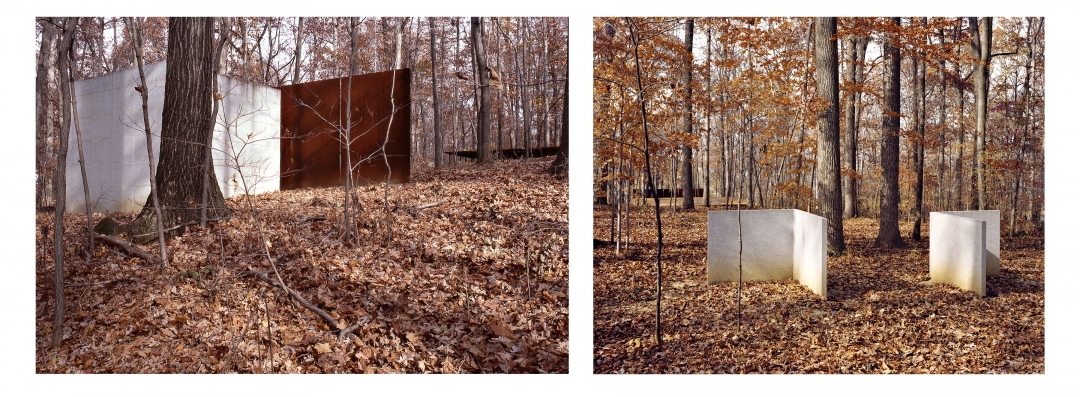
Richard Fleischner, Baltimore Project, 1980, ten steel and granite elements on a two-acre site, Woodlawn, Maryland. Left: secondary axis from granite cube, steel plane, horizontal plane; right: secondary axis from implied cubes toward steel plane. Image courtesy Richard Fleischner. © Richard Fleischner.
JG: The pandemic has emptied our streets, parks, and sports arenas. For years your work has engaged the remnants of social structures and the relationships between things that define human context, what you have identified as 'critical distances', are there new social structures that have come into your sight lines of late that embody the tensions and absences we all are feeling?
RF: "Critical distances" is the term that I have given to a system of measurement that makes a place suitable for human proportions, and its specific uses. It’s intrinsic to spatial relationships; nothing can be arbitrary. For example, in the game of baseball the distance between the pitcher’s mound and home plate is critical. If the distance were just slightly closer no one would be able to hit: if a little further apart no could pitch effectively. “Critical distance” plays a crucial role in all my work, large or small. It determines the scale and placement of elements within a particular context.
With the streets empty, relationships between the forms that surround us have made themselves visible. When the opportunity is there, I photograph street surfaces. Most of these photographs look at crossing lines, spray-painted markings, and other marks for work on the street; they become legible signs to those that understand them in order to do the necessary work. They are determined for the most practical reasons.
These visual references dovetail in with the visual vocabulary that I utilize so much in my work. The surface texture and geometric forms share visual similarities, but it is the absolute un-intellectualized nature of how these forms came to be that resonates the most with me.

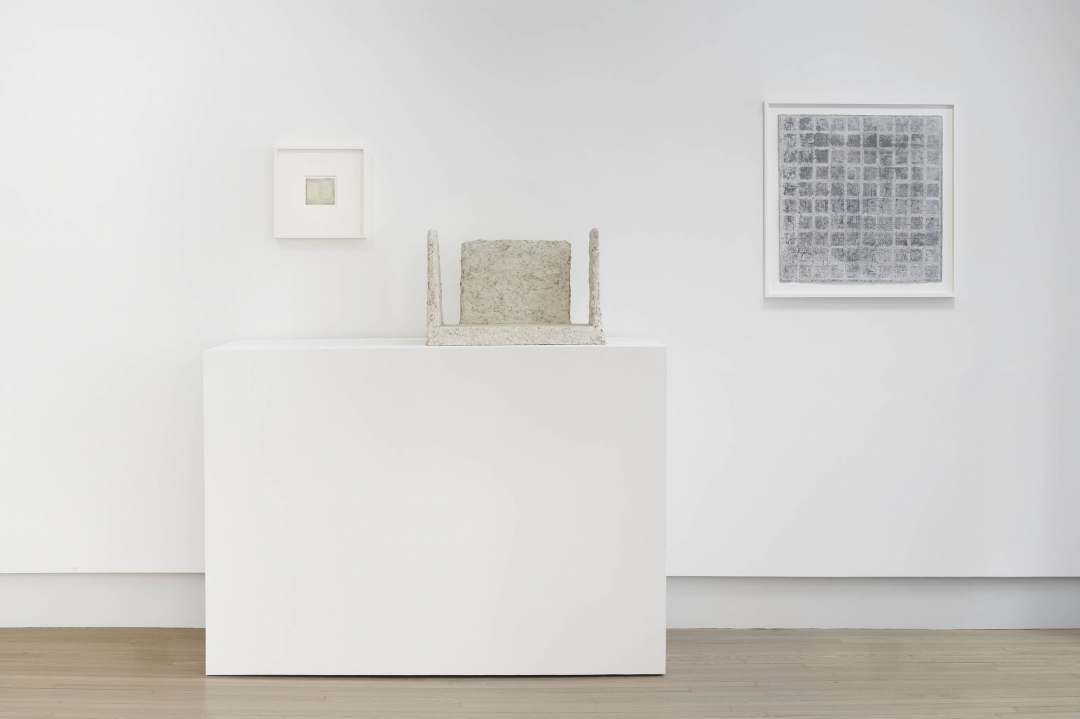
Above, from left to right: three images of spray-painted geometric forms on the streets of Providence, New York. Photographed 2017 - 2020. Images courtesy Richard Fleischner. © Richard Fleischner.
Below: Installation view, Richard Fleischner: Witness Mark. February 12-June 30, Helwaser Gallery, New York. Image courtesy Helwaser Gallery, New York. Photo: Phoebe d’Heurle.
JG: The empty social spaces that you have modeled over and over again in your work seem prophetic now. Do those sculptures and images feel like they are residing in a moment they anticipated or do you see them as you always have?
RF: I see them as I always have. Most of my works bear a certain melancholy, and I often depict empty spaces, but not because I am trying to actively emphasize the emptiness of it. Rather, so much of my work — particularly, my sculptural works — often use the elements that are the first and last that make a place exist. Most of my works, especially, evoke the gesture, or even a remnant of a place. In a sense, my works are modeled after ruins. So the answer is, no, they don't reside in a moment. I see them as the most basic universal conditions of structure. They capture a time that is no longer there — but the ghost of which is still there, and still present, and remains evocative in that way.
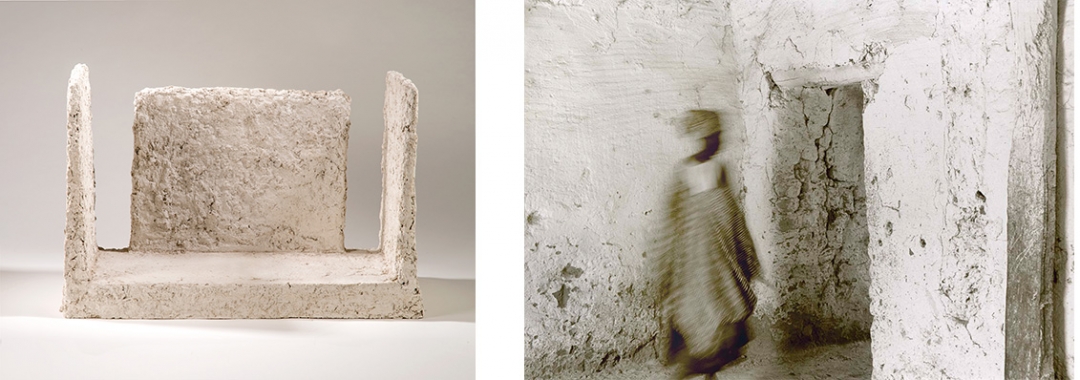
Left: Richard Fleischner, Untitled Construction, 2016. Steel, earthen-plaster, milk paint. 15 ¼ x 22 1/8 x 12 1/8 in. (38.7 x 56.2 x 30.8 cm). Right: Woman passing through a house in Mali, Africa, 2007. Image courtesy Richard Fleischner. © Richard Fleischner.
Experience the current exhibition in our online viewing room
| Richard Fleischner: Witness Mark |
Learn more about the artist
| Explore now |
{{title}}
{{year}}
{{medium}}
{{size}}
{{price}}
{{status}}
Clearwater Contemporary Art, LLC (d/b/a “Helwaser Gallery”) is committed to protecting and respecting your privacy. This privacy policy describes the Personal Data which Helwaser Gallery collects about you through your use of our Platforms, and also sets out how we use, disclose, and protect this data. It also outlines your choices and rights regarding the personal information you have provided to us.
This policy applies to all Personal Data processed online by Helwaser Gallery through its website, social media platforms, email, and newsletter subscription service.
For the purposes of this Policy:
“Personal Data” means any information relating to an identified or identifiable natural person, where an identifiable natural person is one who can be identified, directly or indirectly, in particular by reference to an identifier such as a name, an identification number, location data, an online identifier or to one or more factors specific to the physical, physiological, genetic, mental, economic, cultural or social identity of that natural person; and
“process”, “processed” and “processing” means any operation, or set of operations, which is performed on Personal Data or on sets of Personal Data, whether or not by automated means, such as collection, recording, organisation, structuring, storage, adaptation or alteration, retrieval, consultation, use, disclosure by transmission, dissemination or otherwise making available, alignment or combination, restriction, erasure or destruction.
What information do we collect?
You may give us information about you by filling in forms when using our services, signing up to our newsletter or contacting us with enquiries. Such information can include:
1. Your name, address, telephone number and e-mail address; and
2. Data including artwork information, artworks owned, requested, offered, reserved, purchased, consigned and details of artwork invoices.
Information about your usage of, and interaction with our website. we may automatically collect data about your browsing activities including traffic data, location data, the originating domain name of your Internet service provider, and statistics on page views.
We keep your information confidential, but may disclose it to our personnel, suppliers or subcontractors insofar as it is reasonably necessary for the purposes set out in this privacy policy. However, this is on the basis that they do not make independent use of the information, and have agreed to safeguard this information.
In addition, we may disclose your information to the extent that we are required to do so by law (which may include to government bodies and law enforcement agencies) in connection with any legal proceedings or prospective legal proceedings, and in order to establish, exercise or defend our legal rights (including providing information to others for the purposes of fraud prevention).
How do we use the information collected?
Your Personal Data is generally processed by us as necessary for purposes directly related to our functions and activities. This includes any one or more of the following purposes:
We also use various forms of marketing to provide you with promotional materials for the purposes of marketing in accordance with our legitimate interests to send you information about gallery exhibitions and events. We use third party email providers, such as MailChimp, to process these marketing emails. If you would like to be removed from this mailing list, please contact us at info@helwasergallery.com or click on unsubscribe at the bottom of each marketing email.
We may share your Personal Data with our selected third party providers and suppliers for the performance of delivering our Service under the contract between you and Helwaser Gallery, including processing payments and delivering artwork to you in accordance with your instructions. Our third party suppliers will have their own processing terms. Where we reasonably believe that you are or may be in breach of any of the applicable laws, we may use your personal information to inform relevant third parties such as your email/internet provider or law enforcement agencies about the content.
Consent
Helwaser Gallery does not process the Personal Data of persons 16 years of age or younger, except where express consent has been communicated to us by a person capable of giving such consent on his/her behalf. Where the processing of your Personal Data does not fall under one of the bases set out within this policy, we will obtain express written consent from you for such processing by methods or means which include making you sign a form or check a box. You can withdraw such express consent at any time by contacting us at info@helwasergallery.com
You have the right to request a copy of the personal information we hold about you and to have any inaccuracies corrected.
We will use reasonable efforts to the extent required by law to supply, correct or delete personal information held about you on our files (and with any third parties to whom it has been disclosed to).
Access to Personal Data
You may request access to, and correction of, your Personal Data held by us by contacting us at the contact details at any time. All requests for access and/or correction will be processed within a reasonable time except where we refuse such requests in accordance with any applicable laws or regulations. In some situations, you may be able to access and correct your personal information directly through our Platforms.
Safeguarding Personal Data
We will use reasonable technical and procedural measures to safeguard your Personal Data, for example, by: ensuring that access to any personal account you have with us is controlled by a password and username which are unique to you; storing your Personal Data on secured servers; and restricting access to Personal Data on a ‘need to know’ basis.
Whilst we will use all reasonable efforts to safeguard your Personal Data, please note that the use of the Internet and/or our Platforms cannot be made entirely secure and we therefore are unable to guarantee the security or integrity of any Personal Data which is transferred from you or to you via the Platforms.
Object to us processing data about you
You can ask us to restrict, stop processing, or to delete your Personal Data by contacting us at info@helwasergallery.com if:
If you inform us that you would no longer like us to store or process your Personal Data, we may be required to collect information from you each time you interact with staff members or through our website.
Making a complaint
If you are unhappy with the way Helwaser Gallery is processing your Personal Data, please let us know.
By email: info@helwasergallery.com, referencing “Privacy Policy”
By mail: Helwaser Gallery, 833 Madison Ave, Third Floor, New York, NY 10021
Data retention
We will hold your personal information on our systems for as long as is necessary for the relevant service or as required by law, or for accounting or regulatory purposes, or as otherwise described in this privacy policy.
Changes to our policy
We will notify you of any changes to this policy by email, or announcing it on our website.
Further rights of data subjects in the European Union (“EU”)
If you are a data subject in the EU, you may contact us to exercise the following further rights:
All requests made to us in exercising the rights above will be processed within a reasonable time except where we refuse such requests in accordance with any applicable laws or regulations.
Updated August 2019